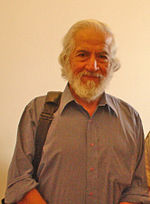About Gabriel Salazar
- Gabriel Salazar Vergara, (Santiago 31 January 1936) is a Chilean historian.
- He is known in Chile for his study of social history and interpretations of social movements, particularly the recent student protests of 2006 and 2011–12. Salazar was born into a lower class religious Catholic family.
- His family lived in the Santiago shanty-town (población) Manuel Montt.
- He studied history, sociology and philosophy at Universidad de Chile, and for time he was assistant of historian Mario Góngora.
- Salazar used to be a member of the Revolutionary Left Movement until 1973.
- In that year he was tortured in Villa Grimaldi by the military.
- Having been released from a military prison camp in 1976 he went into exile in the United Kingdom.
- There he obtained a scholarship for continued studies in University of Hull.
- He obtained a Ph.D.
- in Economic and Social History from that university in 1984.
- Next year he returned to Chile.
- Relatively unknown Salazar's breakthrough came in 1985.
- His subject of study has included peons, labourers, proletarians, child huachos and women.
- Salazar is one of the founders of the historiographic current known as Nueva Historia Social.
- Salazar considers history as a useful tool for social action.
- In interview he has declared himself a "leftist, critical social historian" and rejected the label "Marxist".
Read more at Wikipedia


 Date of Birth:
Date of Birth:  Place of Birth: Santiago, Santiago Metropolitan Region, Chile
Place of Birth: Santiago, Santiago Metropolitan Region, Chile